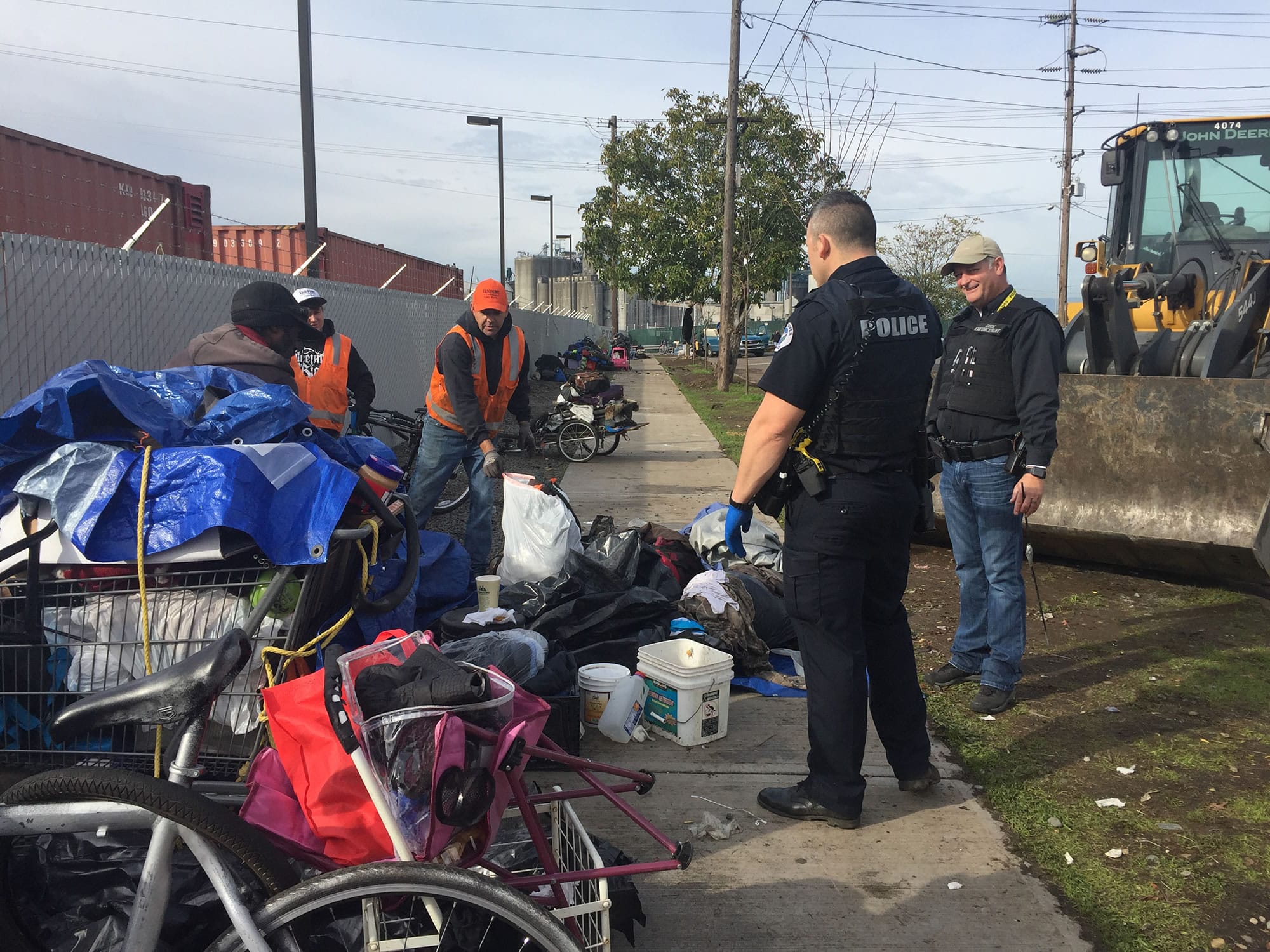A Vancouver City Council workshop meant to review and discuss the unlawful-camping ordinance sparked discussion of several issues related to living outside: lack of restrooms and storage facilities, the status of the day center and criminalization of homelessness.
Up in the air was what should be tackled first, what exactly should be done and why — revealing just how nuanced the growing issue of local homelessness has become. Monday’s workshop was a sort of preamble to the joint city-county meeting on homelessness May 1 at the Vancouver Community Library.
Jonathan Young, assistant city attorney, and Vancouver police Lt. Greg Raquer reviewed the unlawful-camping ordinance, which was revised in the fall of 2015 to allow people to camp between 9:30 p.m. and 6:30 a.m. on most publicly owned property. Camping used to be unlawful in all places at all times, which criminalized status rather than conduct, Young said.
The Department of Justice issued an opinion stating it is unconstitutional to ban people from sleeping outside when adequate shelter space does not exist. Vancouver’s shelters are regularly full, and the city has not increased shelter capacity for years, aside from a 12-bed women’s shelter at St. Paul Lutheran Church that runs April through October. Over the past year, only 37 percent of people actively trying to get into a shelter in all of Clark County were able to do so. And, the number of people living outside in Clark County has increased. During a single-day census of the homeless population on Jan. 26, case workers and volunteers counted 269 unsheltered people, including 80 children. That’s 41 more people than in last year’s count.
Sentencing for Unlawful Camping Citations
• In most cases, the jail sentence is one to two days with credit for time served, if any.
• The offender’s only financial obligation is the mandatory filing fee. There is no sanction if they’re unable to pay.
At past city council meetings, some people have advocated for extending camping hours to give people living outside more time to sleep, shelter from the elements and access to services. On the other hand, downtown residents and business owners have lamented the issues they face dealing with people staying on their property and cleaning up after them.
One option in revising the camping ordinance is to add an hour in the evening so people could start camping as early as 8:30 p.m.
“That seems to be a nice, easy fix in one case,” Councilor Anne McEnerny-Ogle said. She added that an additional hour in the morning would be problematic because businesses are already running into issues at that time.
“The frustration of our business owners is around our current inability to enforce our ordinance,” said Councilor Ty Stober.
Another proposition, which Stober favored, was to change camping hours from sunset to sunrise, which would fluctuate with the seasons. But then, people could start camping as early as 4:30 p.m. at certain times in the winter and have to break camp as early as 5:20 a.m. in the summer.
“Now we’re adding layer upon layer of complexity,” Councilor Jack Burkman said. “Whether we move an hour here or there, I don’t see it as fixing the problem.”
The lack of restrooms and storage facilities would remain with a change in camping hours.
Most camping citations are issued in the morning, when Vancouver police experience the heaviest volume of calls for service.
“I’m not in favor of extending the hours,” Raquer said. “We just can’t get down there (downtown) on a consistent basis, say at 8 a.m.”
He said that if camping hours were to change seasonally, that would confuse people living outside, who have seen signs posted with the camping hours and have been educated about the ordinance as is.
The city has done two large-scale cleanups of the streets around Share House, the downtown men’s homeless shelter at Lincoln Avenue and 13th Street. One was in November and the other was last month. Without a diligent enforcement model, these conditions have recurred, Young said. Last month’s cleanup including staffing, property storage and waste removal cost more than $16,000, he said.
While downtown is the area with the greatest number of people who are visibly homeless, people camp at parks and trails around Clark County, Raquer said. And smaller, ongoing cleanups happen at those locations, too.
Although the Vancouver Police Department plans to add 61 new positions by 2020, traffic patrol is a big priority. So, there are competing interests in terms of where officers should focus their energy.
Most people convicted of unlawful camping are sentenced to one or two days in jail with credit for time served. One possibility is changing that from a criminal offense to a lesser civil infraction (on par with a parking ticket).
“I think that criminalizing homelessness is a sin. I think it’s absolutely terrible,” Councilor Alishia Topper said.
Currently, an unlawful-camping conviction can impede people from successfully getting into housing.
“If we make it a civil infraction, they don’t have money to pay for it. What’s the next step? What if they don’t pay?” Burkman said, adding that the lesser consequences become a lesser deterrent.
He advised keeping the ordinance as is and addressing the other, related issues first.
Topper said that while she empathizes with people trying to set up and tear down their tents in the dark or during poor weather, she sees the larger issue of people trying to carry all of their possessions with them. Maybe the focus should be on getting a new day center up and running, she said, adding that she hopes by next winter the city has more permanent shelter to offer people.
“I too am struggling with this issue being a self-proclaimed advocate for the homeless,” Topper said.
Mayor Tim Leavitt suggested revisiting conversations around hours at another date closer to winter, when daylight and weather are bigger problems.
At future workshops, the city council plans to address storage of personal property, the day center, shelter capacity, restrooms and the criminalization of camping. The discussion around revising camping-ordinance hours will apparently be held off until September.




